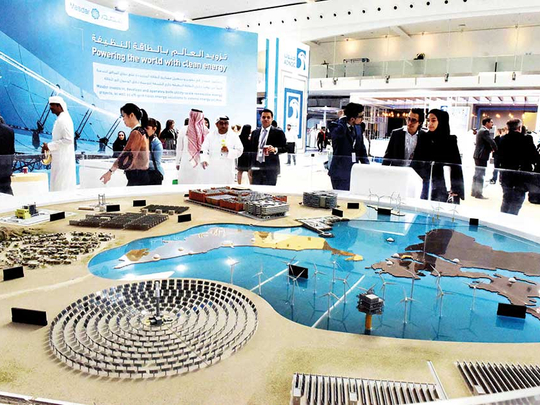
Abu Dhabi: Masdar is planning to double its current portfolio size in renewable energy over the next five years and expand its operations to countries in south-east Asia and North and South America due to an increase in demand for clean energy, a top executive of the Abu Dhabi-based firm told Gulf News in an interview on Wednesday.
Masdar is active in 20 countries with an installed capacity of nearly three gigawatts. It plans to grow to six gigawatts capacity by 2023.
“We would like to further expand into south-east Asian market and Americas both in wind and solar power generation. We are in the early stage of business development and will be screening opportunities one by one as we focus on expansion,” said Badr Al Lamki, executive director of clean energy at Masdar.
Malaysia, Thailand, Vietnam and Indonesia are some of the countries which the company is targeting to launch their operations in south-east Asia.
The clean energy firm is also looking into new opportunities in Indian sub-continent especially in India and Pakistan due to growing demand for renewable energy projects.
“We will be able to design, supervise construction, operate and arrange financing. We also have secondary technologies like waste to energy.”
Asked how much investment the company is targeting in the coming years, Al Lamki did not disclose the exact figure but said the financial matrix will depend on the type of the project being executed.
Masdar has invested $2.7 billion to date in various renewable projects across the globe.
Speaking on Masdar’s future plans in the Gulf region, he said they are mainly focusing on regional markets like Saudi Arabia and Oman, apart from the UAE.
“The UAE is certainly a great example for the region, and it is among the first to set targets with 24 per cent of clean energy by 2021, and 44 per cent by 2050.”
“Saudi Arabia is targeting 9.5 gigawatts by 2023. It’s a huge market and a regional market. Masdar will continue to be interested and continue to seek opportunities to invest in Saudi Arabia and also other Gulf countries,” Al Lamki said.
The company is also looking to participate in renewable energy projects in Oman.
“[The] renewable sector has picked up momentum and there are economic benefits of adopting renewables. We are excited about future.”
Jordan project
Meanwhile, Masdar-led joint venture announced the completion of financing to develop Jordan’s largest solar power project.
International Finance Corporation (IFC), a member of the World Bank Group, has arranged a financing package of up to $188 million (Dh690.5 million) for the 248 megawatt Baynouna facility being developed by Masdar in cooperation with Finnish Investment Company Taaleri group.
To be completed in the second quarter of 2020, the Baynouna solar energy project will supply approximately 110,000 homes while displacing an estimated 360,000 tonnes of carbon dioxide annually, the equivalent of taking nearly 80,000 cars off the roads.
Generating 563.3 gigawatt hours (GWh) of electricity per year, the project is expected to meet three per cent of Jordan’s annual power consumption.












